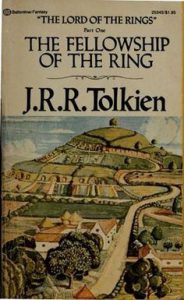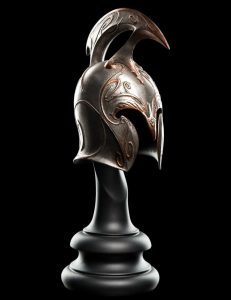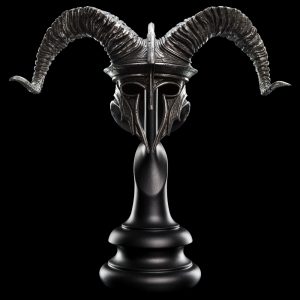 Tonight, fans can add another helm to their growing 1:4 helm collection. This time, it happens to be my favorite Ringwraith design from The Hobbit: The Battle of the Five Armies.
Tonight, fans can add another helm to their growing 1:4 helm collection. This time, it happens to be my favorite Ringwraith design from The Hobbit: The Battle of the Five Armies.
Khamûl The Easterling might have been the most unique looking Ringwraith we saw during the entire Dol Guldur sequence, and this highly detailed helm by our friends at Weta Workshop gives you the chance to have a closer look at some of that. Limited to only 750 pieces worldwide, I don’t expect this to last long, and then maybe that will lead to a full 1:6 statue of this awesome looking character.
You can pre-order yours now right here for delivery in early 2018.
Posted in:
Share:

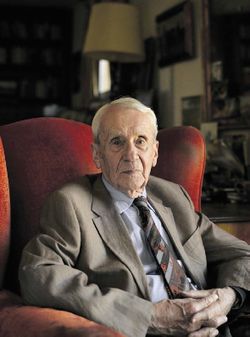
It turns out a “Lord of the Rings” TV series isn’t the biggest Tolkien news of the week or the month or the year.
Christopher Tolkien, son and literary heir of J.R.R. Tolkien, resigned from the Tolkien Estate. And his departure changes everything.
Christopher is 93 and just this year edited and published one of his father’s works “Beren and Luthien,” which as even casual Tolkienites know, refers to his parents with the names of those characters adorning their tombstones.
In the preface of the book he writes, “this is (preemptively) my last book in the long series of editions of my father’s writings.” It seems he was planning to retire already. Personally, learning the greatest Tolkien scholar, and a man who has honored his father in an exemplary way, has left the care of his father’s legacy to others feels like reading the end of LOTR where Galadriel, Elrond and the other great elves leave Middle-earth. There is a keen sadness, but admiration and beauty as well.
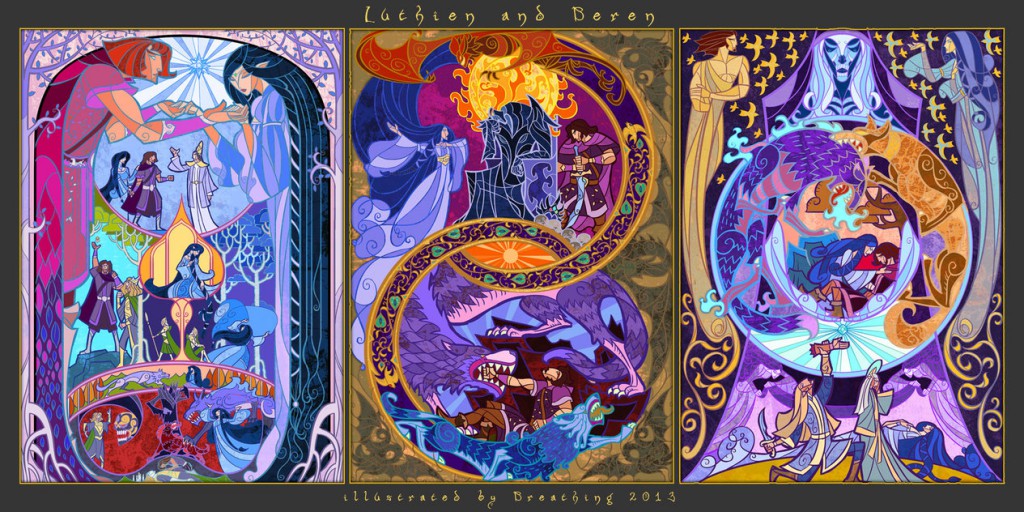
But even if you aren’t sentimental, he deserves any Tolkien fan’s deep respect. But it bears repeating, this changes everything.
The news reached me by friend Michael Martinez via Twitter on his blog. Martinez has an exceptional mind for Tolkien.
He understood perfectly that Christopher R. Tolkien’s departure signals the end of an era.
“With Christopher’s departure as an officer of the Tolkien Estate (which was incorporated in 2011), the long-awaited “rights frenzy” for Tolkien properties may soon begin,” he wrote.
Yes, and it seemingly has already happened. This is a definite piece of the puzzle of the recent news of the Amazon Video deal. I had heard through rock solid, but not reportable sources several years ago that other members of the estate were much more willing to negotiate J.R.R. Tolkien’s properties while Christopher was far more interested in preserving legacy than money.

The settlement between Warner Bros. and the Tolkien Estate settled an $80 million lawsuit July 3. Part of the statement the studio released at the time was unusually upbeat for an entity that just paid out big money:
“The parties are pleased that they have amicably resolved this matter and look forward to working together in the future.”
The future mentioned in that statement is this week and beyond, and it was obviously in the works then. According to a U.K. government website, Christopher resigned on Aug. 31. One would expect formal resignations of this nature take time to manage legally, so it also was in the works for some time I suspect. What I wouldn’t give to have been in the room for that passing of the torch.
So in quick fashion, after the seismic change, the estate has sold the television rights for book “The Lord of the Rings.” Warners paid the court dispute so there would be a relationship moving forward and Amazon’s Jeff Bezos rewarded both entities handsomely.
Another important thing to note here, and another piece of the puzzle, is that the television rights to “The Hobbit” and “Lord of the Rings” were NOT sold when J.R.R. Tolkien sold the movie rights in 1969. Those rights were for motion pictures. TORn staffer and author Kristin Thompson informed our staff about this. She has first-hand documentation and as author of “The Frodo Franchise,” knows this stuff as well as anybody. And obviously you can and should buy her book on Amazon.com. I believe another TORn news article is expected on just this point.
This explains why the estate was so involved in the Amazon deal; they were selling something. It also explains why Middle-earth Enterprises was absent from the latest news. (Correction: This originally said Tolkien Enterprises, a name previously used that is not correct. The story has been updated.)
But the bigger ramifications of all this are far greater than a multi-season Amazon series. The new leadership of the estate seem much more willing to deal Tolkien properties than Christopher was and this confirms my well placed sources.
This opens up Tolkien and Middle-earth as possible franchises in the same way that Harry Potter’s world is a place you can visit at Universal Studios or that Disney will soon have a Star Wars area. There are few properties in the world that can be talked about in the same way as Middle-earth. Warner Bros. see the value and so does Amazon.
That doesn’t mean the Tolkien Estate will move toward making the rights to “Beren And Luthien” available but it does mean my wish to produce “The Silmarillion” as HBO series is slightly less impossible than it was before. That is what has changed really. Things once impossible are now possible.
The estate may elect to only allow more content based solely on “The Hobbit” and “The Lord of the Rings.” Or they may carefully cultivate the entire library.
Because of the depth of J.R.R. Tolkien’s legendarium, there is a virtually endless fountain of material. As Martinez points out in his blog, what will be produced is essentially fan fiction. As Disney has expanded the Galaxy far-far away, and HBO is planning its growth of George R.R. Martin’s Westeros world, so too could Amazon and Warner Bros expand Middle-earth.
Much of that possibility rests with the estate but just Appendix A in “The Lord of the Rings” offers a wealth of content. The imagination soars with possibilities.
This will no doubt anger many fans and delight many others, as the Amazon deal already has. Some don’t want to see the compromise of the author’s vision. Funny enough, this also seems to have a whole new batch of fans upset because they don’t want Amazon’s product to compromise Peter Jackson’s vision of Tolkien’s vision.
The officers of the Tolkien Estate still count among their numbers Tolkien’s youngest child Priscilla Tolkien and other grandchildren in the family.
This is over-long already but a final word on Christopher Tolkien’s departure. Here is a man who is a treasure, and who carries in his heart and mind the voice and essence of his father. The significance of his departure cannot be over stated.
I close with another poignant passage he wrote about his father in the preface of his final contribution to the Tolkien legacy, “Beren and Luthien.”
“In a letter to me on the subject of my mother, written in the year after her death, which was also the year before his own, he wrote of his overwhelming sense of bereavement, and of his wish to have Luthien inscribed beneath her name on the grave. He returned in that letter … to the origin of the tale of Beren and Luthien in a small woodland glade filled with hemlock flowers near Roos in Yorkshire, where she danced; and he said: ‘But the story has gone crooked, and I am left, and I cannot plead before the inexorable Mandos.’
Thank you Christopher Tolkien. We are going to miss you and your strength and determination to contribute to and preserve the legacy of your father.
Posted in:
Share:

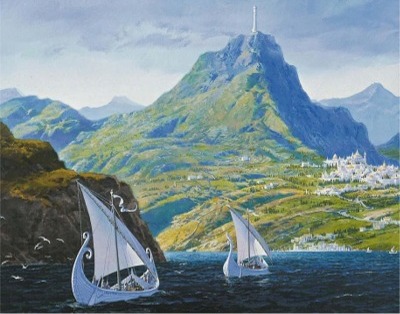 You know that new “The Lord of the Rings,” series that was just announced by not only Amazon Video and Warner Bros. but the Tolkien Estate?
You know that new “The Lord of the Rings,” series that was just announced by not only Amazon Video and Warner Bros. but the Tolkien Estate?
It has everyone on the interwebs with even a passing interest in Middle-earth speculating on the content, imagining how it will tie in to beloved LOTR characters like Bilbo, Frodo, Sam, Gandalf and Aragorn. It has even brought “The Silmarillion” to the forefront of the conversation, with people praying to Eru Iluvitar for an adaptation of J.R.R. Tolkien’s epic, sweeping mythology.
However this series cannot be, and will not be, an adaptation of that work because the rights haven’t been sold. The Tolkien family has clearly decided not to do so. So sorry Silmarillioners — yet, some hope yet remains.
The information given to media, and covered widely from Entertainment Weekly to the Associated press to The Hollywood Reporter, uses “Lord of the Rings” seven times in six paragraphs, but then seemingly contradicts that usage with language that also comes directly from the press release.
Lets look:
“Amazon’s LOTR series will be set in Middle-earth and explore new storylines preceding Tolkien’s The Fellowship of the Ring.”
So if we made a TV series about the Great Depression in the U.S. (1929 to 1939) but it takes place during World War I (1914 to 1918) is it really about the Great Depression?
“The Lord of the Rings” title’s frequent use is no accident. It is an intentional marketing strategy employed in the press release. PR writers and lawyers deliberately wrote “The Lord of the Rings TV series” as often as possible and hoped the media would echo it and, it worked. But is it true? How is something set before LOTR a LOTR series?
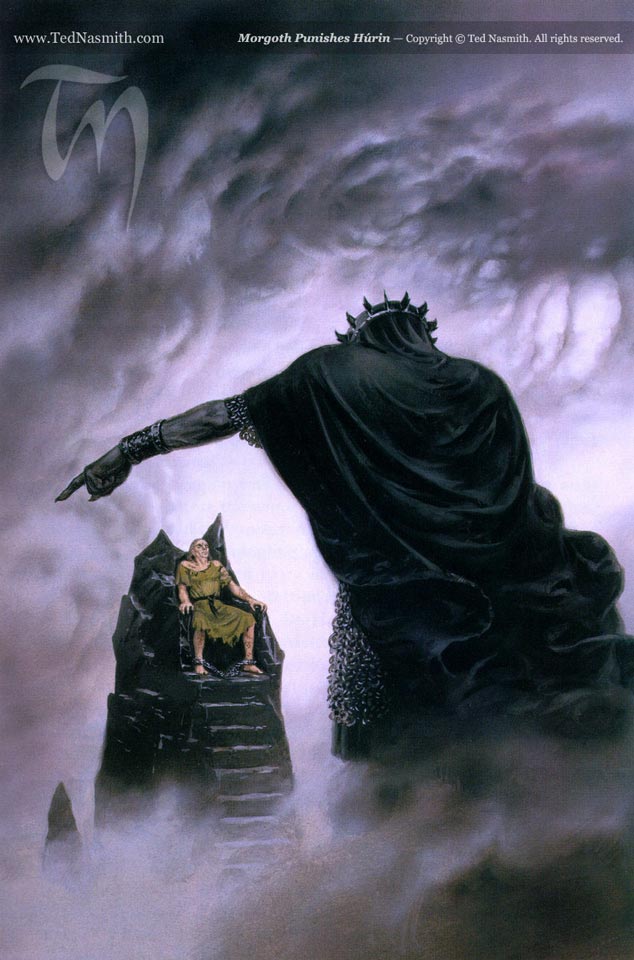
What didn’t make it into most media accounts, but that you can see at the end of the story, is the press release name drops that also mention Peter Jackson, New Line Cinema, the titles of the three movies and book, Elijah Wood, Viggo Mortensen, Ian McKellen, Liv Tyler, Sean Astin and Orlando Bloom and 17 Academy Awards — including Best Picture.
This will be said over and over between now and when the Amazon series goes live for the first time.
Check the quote again:
“… LOTR series will be set in Middle-earth and explore new storylines preceding Tolkien’s The Fellowship of the Ring.”
There they go dropping another book title in the story and then clearly state the series explores NEW story lines that happen BEFORE the book begins. It really can’t be much clearer. The events in the series happen before the book(s) and the Peter Jackson films that adapted them.
More on Jackson later.
A little further down the story comes a quote from a representative of the Tolkien Estate and Trust, from a person almost no potential viewer has heard of but who speaks with the authority of Tolkien.
“Sharon and the team at Amazon Studios have exceptional ideas to bring to the screen previously unexplored stories based on J.R.R. Tolkien’s original writings,” Matt Galsor said.
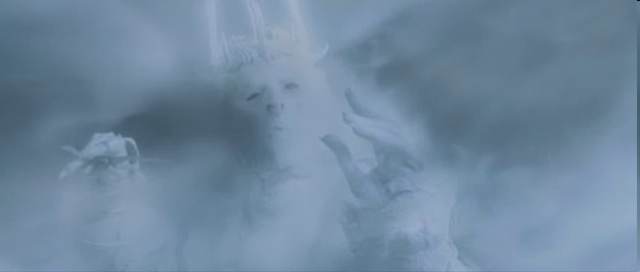
We like that part: “based on J.R.R. Tolkien’s original writings.”
We all know Tolkien’s story has a page one where the story starts. We all know the story ends with THE GRAY HAVENS chapter and the sentence, “He drew a deep breath. “Well, I’m back,” he said.”
So how is this TV series actually a “Lord of the Rings” series that happens before the books begin but also isn’t “The Hobbit” but is based on the author’s original writings?
You may already know. We think of Tolkien selling the story of LOTR but he didn’t. He sold the LOTR as a book, not as a story.
Tolkien managed to get Harper Collins to publish the third part of his “The Lord of the Rings” book with a group of appendices, organized into sections A to F. When Tolkien famously sold the rights of his book(s) to United Artists in 1969, it was about what was between the covers — not the start and finish of the story — and that includes those sections on languages, writing and spelling, calendars and family trees.
But Appendix A and Appendix B aren’t just lists or dates. They offer out what the press release promises, “storylines preceding Tolkien’s The Fellowship of the Ring … based on J.R.R. Tolkien’s original writings.”
So yes, the series will explore the past, perhaps the distant past, before the story of the War of the Ring and yet, it will still be based on the contents between the covers in “The Lord of the Rings.”
****** SPOILER WARNING ******
To save you from running to your copy of the books, here is a brief summary of the material that is legally available for production and is part of what Tolkien sold, the book “The Lord of the Rings” :
APPENDIX A – THE NUMENOREN KINGS
You “Silmarillion” supporters, sad because there is no chance of an adaptation of that book, can keep your candle burning. But it might only be a fools hope. The only content legally available is a recap of the Sil in LOTR. It doesn’t have everything but it has some big stuff. We get three jewels, their theft by Morgoth, his fortress called Thangorodrim, war against him from the baddest Elves, and Luthien Tinuviel and Beren getting a Silmaril from Morgoth’s Iron Crown and more, but all of this is just a smattering from the massive scale story of the Elves and Men.
Numenor and its line of kings that eventually lead to ruin and the scattering of the realms in exile, might work as a multi-season series. If you recall, Appenix A also has the kings of Arnor, Gondor the Dunedain — Aragorn’s people — and the Stewards of Gondor.
Oh and the tale of Aragorn and Arwen.
The history of Rohan is there, as is some of the events leading up to the Dwarves’ mission in “The Hobbit,” films, touched on by them in the three-film adaptation.
So Elves and Men with Dwarves available too if needed. And who can tell the story of the downfall of Men better than an immortal Elf? If I were Amazon, I would lock up Hugo Weaving to a multi-season contract ASAP. He could be the character that holds it all together.
APPENDIX B
Here we find a brief account of the battles in the north during the War of the Ring. It also mentions some wizards and how Gandalf received the Ring of Fire.
We also get some major events of the Second Age dealing with Numenor and the Rings of Power. This content was said to be gathered by none other than Merry, which could provide a narrator to hold the structure together. Is Dom busy?
Thinking this through, it seems probable that the new Amazon series will focus on the kingdom of men and its success and eventual failures, mostly from Appendix A.
Speaking of failures, Deadline reports that Amazon has failed to talk to Jackson and “has not tried to enlist the help of, or even reached out to Peter Jackson.”
PETER JACKSON
In the spirit of full disclosure, Jackson invited me to visit his set for “The Hobbit” films and report on what I saw. He also gave me a lot of access. Some would say that distorts on how I might offer thoughts about his work and his potential work on this project.
Thing is, I can’t fathom that Team Jackson wants to take the reins for the LOTR TV adaptation. I can’t comprehend that he wants to devote more years of his life by returning to Middle-earth. He was hesitant to return for “The Hobbit” and he suffered some backlash for it.
I don’t think he would take the job in either a director’s chair or in a producer’s role.
We can hope other parts of his machine are involved, such as the award-winning Weta Digital and the deeply respected Richard Taylor and his crew at Weta Workshop, but that completely depends on the talent Amazon Video gathers and what they choose to use.
Deadline says Amazon has not tried to enlist the help of, or even reached out to Jackson.
I suspect Amazon, Warner Bros. and the estate want to find somebody fresh.
Amazon Video Lord of the Rings TV series press release by LarryDCurtis on Scribd
Anyway, that is what Amazon is planning to do. And boss Jeff Bezos, one of the most wealthy geeks who ever lived, is willing to spend to make it happen. Join us as we dread and anticipate the latest adaptation of Tolkien’s works.
Posted in:
Share:

Amazon announced today that they’ve acquired the global TV rights to J.R.R. Tolkien’s “The Lord of the Rings”. From the Hollywood Reporter comes further details (note: italics are mine to highlight key words/statements that should give us plenty to discuss in the months and years ahead!):
It’s Official: ‘Lord of the Rings’ TV Series Gets Multiple-Season Commitment at Amazon
by Lesley Goldberg
It’s official: Amazon Studios is going to make a Lord of the Rings TV series.
The retail giant and streaming outlet announced Monday that it has acquired global television rights to the Lord of the Rings franchise, based on the best-selling novels by J.R.R. Tolkien. Amazon has handed out a multiple-season commitment. The Amazon LOTR series will be produced in-house at Amazon Studios alongside the Tolkien Estate and Trust, publisher HarperCollins and Warner Bros. Entertainment’s New Line Cinema. A writer has not yet been attached.
Amazon’s LOTR series will be set in Middle-earth and explore new storylines preceding Tolkien’s The Fellowship of the Ring. The deal includes a potential additional spinoff series.
“The Lord of the Rings is a cultural phenomenon that has captured the imagination of generations of fans through literature and the big screen,” said Sharon Tal Yguado, Amazon’s new head of scripted. “We are honored to be working with the Tolkien Estate and Trust, HarperCollins and New Line on this exciting collaboration for television and are thrilled to be taking The Lord of the Rings fans on a new epic journey in Middle Earth.”
The news comes 10 days after word leaked that Amazon Studios was exploring a potential TV series based on the fantasy novels and subsequent feature film franchise, which was produced by New Line. The LOTR trilogy was named Amazon customers’ favorite book of the millennium in 1999.
The news comes four months after Warner Bros. and the Tolkien estate settled an $80 million lawsuit after a five-year battle. That happened after Warners offshoot New Line Cinema and the Tolkien estate waged a courtroom battle over profit participation from the film franchise that consisted of The Fellowship of the Ring (2001), The Two Towers (2002) and The Return of the King (2003), as well as 2013 prequel The Hobbit. The property is a multibillion-dollar worldwide franchise.
“We are delighted that Amazon, with its longstanding commitment to literature, is the home of the first-ever multiseason television series for The Lord of the Rings,” said Matt Galsor, a representative for the Tolkien Estate and Trust and HarperCollins. “Sharon and the team at Amazon Studios have exceptional ideas to bring to the screen previously unexplored stories based on J.R.R. Tolkien’s original writings.”
…
Posted in:
Share:

 Tonight, fans can add another helm to their growing 1:4 helm collection. This time, it happens to be my favorite Ringwraith design from The Hobbit: The Battle of the Five Armies.
Tonight, fans can add another helm to their growing 1:4 helm collection. This time, it happens to be my favorite Ringwraith design from The Hobbit: The Battle of the Five Armies.


